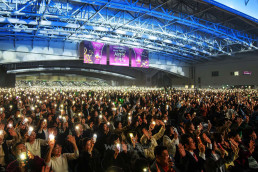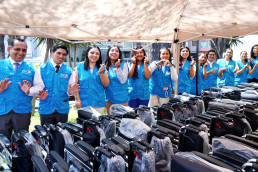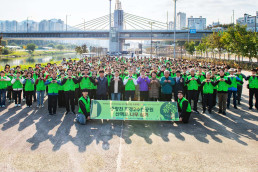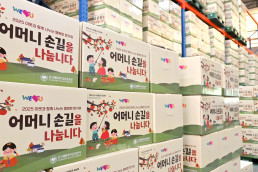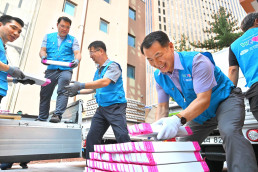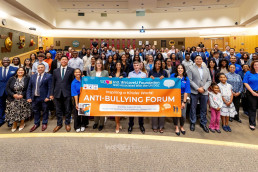Gimjang kimchi made with the migrated women were delivered to 150 multicultural families in Seoul and Gyeonggi Province
“It’s spicy but crispy, so I like kimchi. Now I can’t have meals without kimchi though I don’t know how to make it.”
Migrated women made a family with Koreans and they are learning Korean language and culture as sound members of our society. Now they can be easily found in cities as well as in countryside.
Kimchi is Korea’s national food and the most necessary food for winter. To help the wives of multicultural families learn how to make kimchi and to deliver kimchi that is made with mother’s love and wholeheartedness to the multicultural families in need, the members of the Intl. WeLoveU Foundation rolled up their sleeves.
On November 22, the Intl. WeLoveU Foundation, which has helped its neighbors by giving them kimchi for winter every year, held the 2012 Kimchi-Making Festival to Share Mother’s Love with Multicultural Families in the Yeouido Park, Seoul. Chairwoman of the Intl. WeLoveU Foundation Zahng Gil-jah, Goodwill Ambassador Kim Seong-hwan (actor), PR Ambassador Lee Seong-hun (vocalist) and the first migrated woman lawmaker of Korea Lee Jasmine took part in the festival and encouraged the members.
It was Soseol (which is one of the 24 solar divisions of the year, meaning “light snow”), but the weather was mild under the warm sunlight. The salted Korean cabbage for that day was around 15,000 kilograms [33,000lb]. Chairwoman Zahng Gil-jah and the members trimmed, washed, cut and salted the cabbages from three days before and brought them for the day. Kimchi seasoning were prepared in advance by mixing tasty and healthy ingredients—red pepper powder that is not too spicy by considering the taste of migrated women, oyster, shrimp, squid and pear. As the worktables were set and the piles of cabbages were spread on it, it seemed that the cabbage field was there.
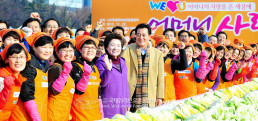
Chairwoman Zahng Gil-jah and the members are making kimchi together with the wives of multicultural families. Goodwill Ambassador Kim Seong-hwan (actor) is at the middle in the photo.
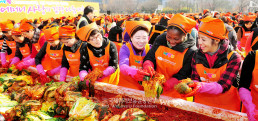
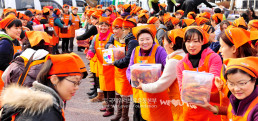
Chairwoman Zahng Gil-jah and the members are carrying kimchi together with the wives of multicultural families.
At around 10:30 a.m., about 500 volunteers—including more than 400 members of the International WeLoveU Foundation(hereinafter referred to as WeLoveU), migrant women from the organization Water Drop Sharing, and participants from the Yeongdeungpo Global Village Center—gathered to prepare kimchi together. Chairwoman Zahng Gil-jah and Korean members demonstrated the kimchi-making process to migrant women from over ten countries, including the Philippines, Vietnam, China, Thailand, Uzbekistan, and El Salvador. Claudia, from El Salvador, reflected: “When I first came to Korea and made kimchi with my mother-in-law, I didn’t understand why she made so much. Later I realized it was all for her children. Making kimchi with that same heart of love to share with neighbors in need makes me very happy.” Veronica, a chef and staff member at the Embassy of Ghana, described the kimchi-making as “an amazing experience” filled with love. “Ghanaians also enjoy spicy food, so we really like kimchi,” she said with a smile, adding that she now felt confident to try making it herself.
At the entrance of the venue, informational panels explained the taste, care, health benefits, and spirit of sharing embodied in kimchi. The sight of people from diverse nations joining together to make kimchi drew the attention of office workers in Yeouido as well as foreign tourists passing through the park. Sylvie, a visitor from Canada, watched with curiosity, capturing the lively scene with her camera. Having worked in a department that supports refugees in Canada, she expressed admiration after learning about the purpose of the event: “This is truly wonderful and meaningful.” Local resident Jeong Sah-rye, who works nearby, also praised the effort: “Making kimchi is not an easy task, but this is such a good deed. Because so many people do good things like this, those in need can keep going.”

Chariwoman Zahng Gil-jah donates kimchi for multicultural families through five borough offices in Seoul (first from left in the picture is the lawmaker Lee Jasmine)

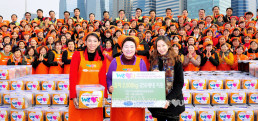
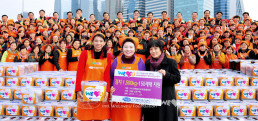

Kimchi that the members made that day were delivered to 1,500 multicultural families in Seoul and Gyeonggi Province, including 1,000 households in Songpa, Yeongdeungpo, Guro, Nowon boroughs of Seoul. Public officials who received kimchi said, “I could feel the members’ warmheartedness when they made kimchi. This event is really helpful to the multicultural families because through this they can understand Korea and adjust to its culture very well. I think this would be a great help to those who receive kimchi as well.” The lawmaker Lee Jasmine, who said, “The color of kimchi is red and it looks spicy, so foreigners who first see it are not easy to try to eat. However, once they taste it, they come to know it’s delicious. I think that kind of challenging spirit is needed to multicultural families,” and also advised, saying, “Most of multicultural families receive help in Korea, but they need to live positively as the member of Korean society like participating in today’s event to help our neighbors.”
After finishing kimchi-making, the WeLoveU Foundation members and migrated women took a commemorative photo. When they wore a smile, saying “kimchi,” they truly were the people of “our country”—our family living in the global village who share mother’s love and warm-heartedness and eat kimchi together with us.

Chairwoman Zahng Gil-jah and the members are making kimchi together with the wives of multicultural families.

<Behind story of the kimchi-making event to share the mother’s love>
#1
Chairwoman Zahng Gil-jah and some members visited several multicultural families in Yeongdeungpo borough in the afternoon and delivered kimchi, rice, other food and daily necessities. Coming from the Philippines, Vietnam, Cambodia or China, most of them were newlywed brides who have just become the mother of a baby, and it was hard for them to make kimchi by themselves because the mother-in-law is old and sick or some other reasons.
“The WeLoveU members made great effort to make this nutritious kimchi. I wish you to enjoy this during the winter and be healthy,” saying this, Chairwoman Zahng Gil-jah delivered kimchi. Having a friendly talk with the multicultural families, she asked the daughters-in-law who are migrated women to depend on their mothers-in-law as if they were their mothers, and asked the mothers-in-law to understand and love their daughters-in-law who live in a strange and foreign land even though it was hard to communicate with them.
Park Byeong-yeon, 74, who said that she was worried because she could not make kimchi for winter as she had a backache, thanked the members for helping them. She understood how much effort we should make for Gimjang. She also said that she would try to learn the Philippine language to know more about her good daughter-in-law. Her daughter-in-law Jennis, 27, made the members laugh by saying, “My mother-in-law is good, too,” and said in Korean that now she could speak fluently.
“I was really surprised. Thank you for giving us this many gifts. You gave us so much help. Thank you for kimchi.”


#2
On the day after the kimchi-making festival, Chairwoman Zahng Gil-jah invited 150 WeLoveU Foundation members who are of multicultural families to the Daedeok Glory Building in Bundang, Seongnam City, and delivered them kimchi and mufflers, and held a luncheon.
Chairwoman Zahng Gil-jah welcomed the multicultural family members and comforted them, saying, “I think you’ve gone though many difficulties since you came to a foreign country, and experienced different culture and weather.” She also said, “People say that this winter will be very cold, so I hope you enjoy this kimchi we made with love, and spend this winter warmly and healthy.” She also asked the members to “give much love to others and bear a lot of fruit of love.” When she warmly encouraged them and held their hands, some members were moved to tears.
Aubertina, 42, Suwon branch, said that she felt mother’s love when she received gifts on this day, and expressed her thanks, saying, “When I followed my husband to a Korean restaurant in Peru, I tasted kimchi and I came to love it from that time. I’ll enjoy this kimchi with my family.” Hauksureng, 67, Yongin branch, who was in Mongolian traditional clothes “del,” said, “I’ve received much love and courage. I give thanks to the chairwoman and the Korean members for preparing this event.” Although they have different nationality, the multicultural family members, who make efforts for the volunteer activities we carry out with love and smile together with us, are all our precious neighbors and our family.
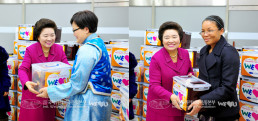
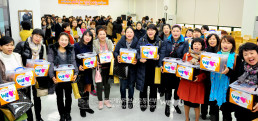
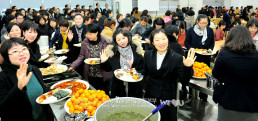
관련영상

The 23rd WeLoveU Concert
The WeLoveU Choir: Songs of Hope Reaching the Global Village
November 9, 2025
Ensuring the Right to Mobility, Opening a Path of People
Providing 400 Wheelchairs for People With Disabilities in Peru
November 7, 2025
Sharing the Warmth of Chuseok With Our Neighbors 2025
Supporting 1,600 Underprivileged Households With Food Packages Nationwide
October 2, 2025
Together With Care: Supporting Housing Settlement for Climate-Vulnerable Households
WeLoveU, in Partnership With Seoul Municipality, Provides Storage Cabinets for 182 Households
September 10, 2025
